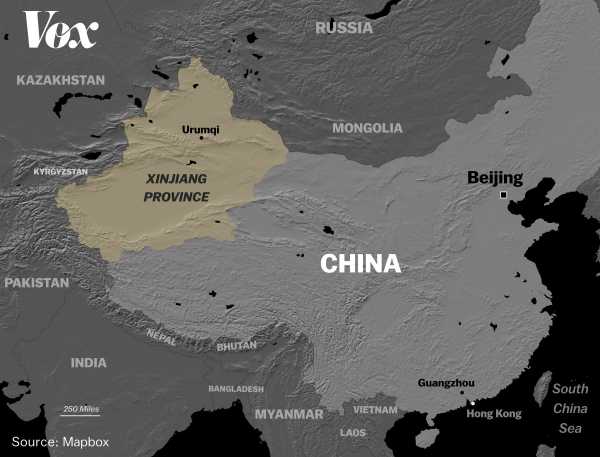
This story is part of a group of stories called

Finding the best ways to do good. Made possible by The Rockefeller Foundation.
It seems like something out of dystopian fiction. Unfortunately, it’s reality.
China has been secretly installing a surveillance app on tourists’ phones as they enter the northwestern Xinjiang region, according to a new exclusive investigation by the New York Times and other outlets. This is the same region where the government has detained an estimated 1 million Uighur Muslims in internment camps.
When you try to cross over by land from central Asia into Xinjiang, Chinese border agents stop you at the port of entry. They insist you hand over your phone, which they take into a separate room while you wait for an hour or more. They install an app called Fengcai, which downloads your phone’s data — all your text messages, contacts, call log history, calendar entries, and installed apps. All this sensitive data is then sent, unencrypted, to a local server.
The app automatically scans your data for 73,000 specific items that China deems threatening. That includes materials that encourage terrorism, like al-Qaeda or Islamic State publications, as well as Western academic books about terrorism. The app also hunts for scanned pages from an Arabic dictionary and benign expressions of religiosity like portions of the Quran or a photo of the Dalai Lama.
Another item Fengcai scans for: music by a Japanese metal band called Unholy Grave. The band’s got a song titled “Taiwan: Another China.”
The major investigation that uncovered details of this app — a collaboration between the New York Times, Vice’s Motherboard, the Guardian, Süddeutsche Zeitung, and the German broadcaster NDR — makes it clear that China’s mass surveillance is increasingly spreading to foreigners.
The app was installed on the phones of several tourists who, after leaving China, went to reporters in Germany with the story. A journalist on the investigative team also attempted to cross the border into Xinjiang and had the same app force-installed before being allowed to enter the region.
Xinjiang is a laboratory for a terrifyingly broad experiment in surveillance
Uighurs, a mostly Muslim ethnic minority concentrated in the Xinjiang region, are used to this sort of surveillance.
China profiles them using a facial recognition system that the New York Times has called “automated racism.” Uighurs are also forced to hand over a wealth of biometric data: DNA samples, fingerprints, voice samples, and blood types. As they walk through the streets, they’re stopped at multiple checkpoints, where authorities inspect their phones.
And China has already forced Uighurs to install a surveillance app on their phones. That app, called JingWang, sucks up data just like Fengcai. Experts have found that the two apps overlap in terms of the content they hunt for, though Fengcai actually seeks out more types of files.
China depicts the Uighur people as a separatist and terrorist threat. It wants to tighten its control over them, especially now that it’s rolling out its Belt and Road Initiative, a sprawling infrastructure project for which oil- and resource-rich Xinjiang is crucial. So it’s been stepping up its surveillance of Uighurs, including by flying drones disguised as birds over the region.

But what happens in Xinjiang doesn’t stay in Xinjiang. The region functions as a laboratory for the authorities’ experiments in high-tech surveillance. Some of the tech they try out on Uighurs is later applied more broadly in the country and even sold abroad. “Xinjiang provides a testing ground from which they can then try it in larger places,” Timothy Grose, a China expert at the Rose Hulman Institute of Technology, told me last year.
I’ve written previously about how China’s crackdown on Uighurs is affecting foreigners. In addition to causing psychological harm to the relatives of Uighurs detained in internment camps, Beijing is also subjecting foreign citizens to arrests without trial, interrogations, and abuse. As BuzzFeed reported in March, several Turkish nationals have disappeared in Xinjiang. These are people who don’t even hold Chinese citizenship. Their families believe they’ve been taken to the camps.
The new revelation that China is installing an app on tourists’ phones to hoover up personal data represents a disturbing escalation. It shows that China is becoming increasingly brazen about whom it targets, and how. The surveillance state is spreading.
If the global community fails to challenge this — as it has largely failed to meaningfully challenge China’s oppression of Uighurs — the development threatens to shift international norms about what kind of surveillance we deem acceptable at borders.
“There is an increasing trend around the world to treat borders as law-free zones where authorities have the right to carry out whatever outrageous form of surveillance they want,” Edin Omanovic, state surveillance program lead at Privacy International, told Vice. “But they’re not: the whole point of basic rights is that you’re entitled to them wherever you are. Western liberal democracies intent on implementing increasingly similar surveillance regimes at the border should look to what China is doing here and consider if this is really the model of security they want to be pursuing.”
Although Western countries are increasingly using facial recognition at airports, they are at least still far from installing surveillance apps on phones. Let’s keep it that way.
Watch: China’s secret internment camps
Reporting for this article was supported by Public Theologies of Technology and Presence, a journalism and research initiative based at the Institute of Buddhist Studies and funded by the Henry Luce Foundation.
Sourse: vox.com






